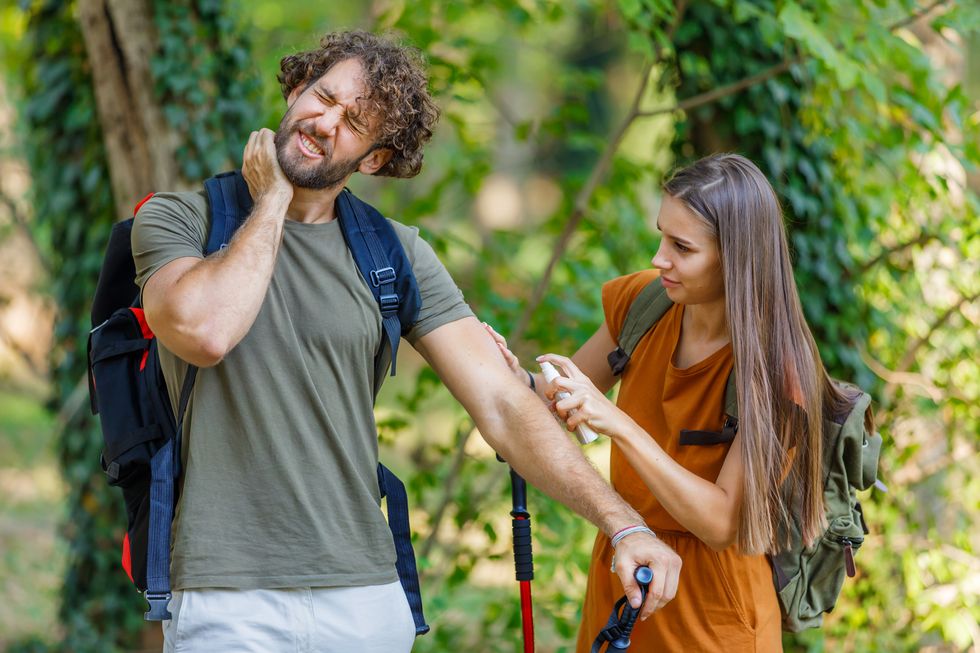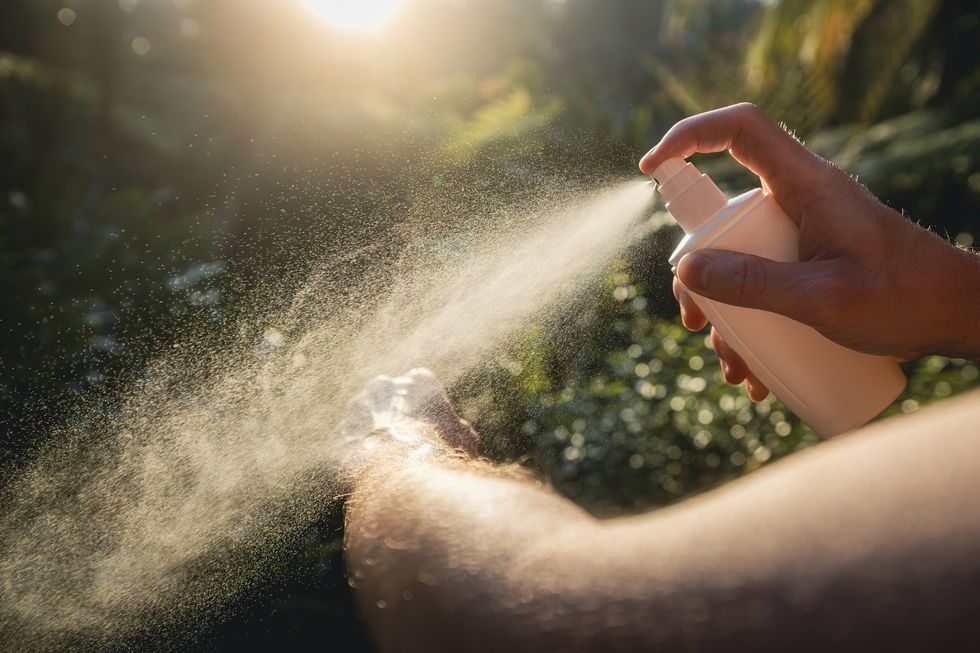WHENEVER YOU SPEND any time outdoors, whether it’s camping, hiking, or just hanging out, you might find yourself covered in red, itchy welts. Mosquitoes and other insects seem to gravitate towards some people, and their bites can cause quite a reaction.
“Bug bites are the textbook explanation of an inflammatory response,” says Jesus Lizarzaburu, M.D., a family physician in Yorktown, Virginia. “Once a person is bitten by a bug, that bite causes an inflammatory reaction which is followed by swelling, redness, and itchiness.”
Bug bites can sometimes be preventable by spraying on insect repellent before heading outside, wearing long sleeves, and trying to avoid the moist, grassy areas where bugs like to hang out. Still, you might still get bitten.
The truth is some people are more susceptible to bug bites than others, and they may have a stronger reaction when they get bitten. There could be several reasons why. Genetics and allergies might play a role in how you respond to bug bites, so do certain blood types, skin chemicals, scents, body temperature, and other factors, says Evelyn Darius, M.D., a family physician with PlushCare.
Getting bug bites can be a nuisance, but they’re usually not serious—however, they could be if you have an allergic reaction. Most of the time, you can treat them easily.
There are several home remedies for bug bites and over-the-counter products that will help stop the itch and reduce the swelling and inflammation. Here’s an overview of why bug bites are so itchy for some people, how to prevent them, and what to do when you get bitten.
Why are some people more susceptible to itchy bug bites?
Mosquitos, in particular, go after certain people. Dr. Darius says several factors contribute to them biting some individuals more than others.

Blood type is one reason. Research shows that some mosquitoes are attracted to people with type O blood. Dr. Darius says that doesn’t mean you’re immune to bug bites if you have a different blood type, however.
Research also suggests that some mosquitoes are more responsive to the carbon dioxide that we exhale.
Insects may also respond to body odors, scents, heat, and the color of your clothing and may be more likely to bite, she adds. One study showed that mosquitoes might be more attracted to dark colors.
Why do bug bites itch?
A bite is essentially a localized allergic reaction in the skin, says Joshua Zeichner, M.D., associate professor of dermatology and at Mount Sinai Hospital in New York City. This is because once you’re bitten, your skin develops inflammation and swelling, which translates to a red, itchy bump.
The itching and inflammation are due to the insect’s saliva triggering the release of histamine, Dr. Darius says, adding that it’s similar to your response to breathing in pollen. Some people have a stronger immune response or sensitivity and may experience stronger itching and swelling.
Though it’s hard not to scratch, the more you do, the worse you can make the situation. Scratching can enhance inflammation and cause the release of more histamine, according to Columbia University. It can also irritate the skin and potentially cause an infection.
How to Prevent Bug Bites
The best way to deal with bug bites is to try to prevent them. Start by using an insect repellent containing DEET or picaridin, Dr. Lizarzaburu says. “You apply these to exposed areas of your skin as well as clothing.”

If you know you’re going somewhere where bugs are likely to be, wear long sleeves and pants. Tuck your shirt into your pants and your pants into your socks to create a barrier, he adds. Wearing light clothing may be less likely to attract bugs, or at least you’ll be able to see them more easily.
You can also treat your clothing with permethrin, an insecticide that kills mosquitoes, ticks, and other bugs, Dr. Lizarzaburu adds.
To avoid mosquitoes specifically, stay indoors at dusk when they’re likely to be out, which is usually at dusk, and screen in your windows and doors, he says.
How to Treat Bug Bites
Itchy, inflamed bug bites can be difficult to ignore, so you’ll want to do something to soothe the skin and ease the discomfort.
“When treating a bite, the goal is to reduce inflammation as quickly as possible and to do what you can to repair the skin barrier,” Dr. Zeichner says.
There are several ways to treat bug bites, including home remedies and OTC treatments:
Hydrocortisone cream
“Over-the-counter 1% hydrocortisone cream is a go-to product for bites, as it helps reduce inflammation and can improve itch,” says Dr. Zeichner. You can grab a tube and carry it with you on your hiking or camping trip in case you get bitten.
Cold therapy
Applying a cold compress or ice pack is an easy and effective way to provide relief from itchy bug bites, Dr. Zeichner says
“The cold constricts blood vessels, which reduces inflammation in the skin,” he explains. Just grab a washcloth and some ice for some quick relief.
Antihistamines
As someone who’s sensitive to bug bites, Dr. Lizarzaburu says he prefers taking an oral, nonsedating antihistamine, like loratadine or fexofenadine. Antihistamines can reduce swelling and hitching. You can also try a topical antihistamine, which has the same effect.
Petroleum jelly
Applying petroleum jelly can help minimize itching while you wait for an antihistamine to kick in. “It forms a protective seal over the skin that allows the barrier to repair itself, especially if you’ve been scratching,” Dr. Zeichner explains.
Colloidal oatmeal
Colloidal oatmeal is a skin-protecting ingredient found in many moisturizers that can soothe itching and inflammation, Dr. Darius says. It’s often used as an eczema treatment, but it can help any type of inflamed, irritated skin.
“Colloidal oatmeal has calming effects which is ideal for bug bites,” Dr. Zeichner says. However, it might not help with significant itchiness.
Honey
Though it might seem like honey would attract insects, it can actually help their bites. Honey has antimicrobial and anti-inflammatory properties, which will reduce swelling and prevent infection, Dr. Darius says. Since it’s sticky, it’s smart to cover the spot with a bandage.
Calamine lotion
Calamine lotion is an ideal solution for bug bites, as it has soothing and anti-itch effects, Dr. Zeichner says. You can simply apply it to the affected area and let it dry to help the skin heal and prevent you from scratching.
Baking soda
Baking soda has antiseptic and anti-inflammatory properties, which help minimize the symptoms of bug bites. The Centers for Disease Control and Prevention recommends mixing 1 tablespoon of baking soda with enough water to make a paste—then apply the paste to your bites for 10 minutes and wash it off.
Aloe vera
Aloe vera can be soothing for bug bites, Dr. Darius says. The gel inside aloe leaves contains salicylic acid, which can stop itching and relieve pain when applied to your bug bites, according to the Cleveland Clinic.
Chamomile tea
The dried chamomile flowers in the tea contain terpenoids and flavonoids, which are natural compounds with antioxidant and antihistamine properties, according to the Cleveland Clinic. Let a chamomile tea bag steep for 20 minutes, and once it cools, press the tea bag onto your bug bite for about 10 minutes.
When to See a Doctor About Your Bug Bite
Some people can develop allergic reactions to insect bites, Dr. Darius says. This might cause flu-like symptoms, such as coughing, sneezing, runny or stuffy nose, or itchy eyes, according to the Asthma and Allergy Foundation of America.
In some cases, someone can have anaphylaxis, a severe, life-threatening allergic reaction, Dr. Darius adds. Seek immediate medical attention if you have trouble breathing, swelling of your throat or tongue, dizziness, skin rashes or hives, stomach pain, nausea, or vomiting.
Keep in mind that insects can sometimes spread illnesses like West Nile virus, Lyme disease, or malaria, according to the CDC. See a doctor if you have symptoms like abdominal pain, nausea, diarrhea, fever, muscle aches, headache, chills, swollen lymph nodes, or fatigue.
